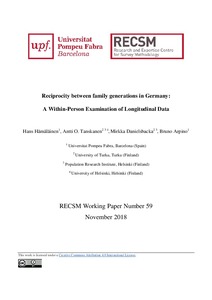Reciprocity between family generations in Germany: A Within-Person Examination of Longitudinal Data
Bruno Arpino; Hans Hämäläinen; Antti O. Tanskanen; Mirkka Danielsbacka
https://urn.fi/URN:NBN:fi-fe2021042823429
Tiivistelmä
Although reciprocity of intergenerational support has been widely considered in family studies, empirical investigations are still rather scarce. This study used data from four waves of the Panel Analysis of Intimate Relationships and Family Dynamics (Pairfam), which inquired the respondents about intergenerational support. We examined whether previously received support from parents is associated with later provision of support to parents. Indicators of intergenerational help were emotional support, practical help, financial aid and personal care. Our analyses used multilevel regression models and investigated both between- and within-person effects. Between-person models indicated mainly positive associations between received and provided support; however, these associations often did not hold in within-person models, which were used to detect individuals’ variations over time. According to within-person models, increased emotional support that sons received from a parent was associated with increased financial support to that parent later. Also, increased practical help that daughters received from their fathers was associated with increased financial aid to their fathers later. The magnitude of these positive within-person effects was small compared to the between-person effects; within-person models did not provide any other evidence for causal intergenerational reciprocity.
Kokoelmat
- Rinnakkaistallenteet [19250]
